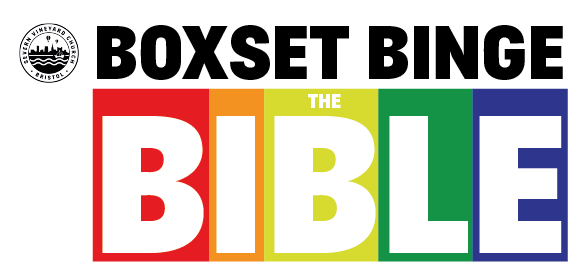

Mark’s Gospel
This is a book about the life of Jesus, who he is and what he did when he gathered the first followers into a new way of life.
The author shows how Jesus was doing something that Israel had long expected, sent by God to save them from oppression, but in very unexpected ways.
God’s intervention through Jesus showed incredible power to amplify small expressions of faith and repentance into major life changes, exploding a small group of followers into a worldwide movement. This was unsettling to people who were comfortable as they were, but good news for everyone who wanted and needed change.
Introduction
Our podcasts on this book
Our notes on this book
Daily notes written in 2020

Reflections written in Lent 2022
More info
Talks on this book
What difference does it make to believe that God is present, protects and provides today? Owen Lynch shares what the gospel means about God’s role in his life, in a context where fewer and fewer friends and colleagues might believe in God or go to church. Can we draw lessons from history about what religious institutions do under pressure, and can we follow Jesus into a different way of life?
What do we think Palm Sunday is all about? Owen Lynch shares about the difference between his understanding as a child and the difficult reality of the story of Jesus’ coming kingdom clashing with the established powers of his time. It was a struggle that would result in death. But if we were there, where would we have been looking for life?
Jesus promised to come back, but what does this mean for us? Owen Lynch looks at the way Jesus’ followers experienced changes and challenges in their world and would have gained hope from believing that Jesus would end suffering and injustice soon. But the Bible also records how their views changed over time, how they dealt with mockery that nothing new was happening and how they came to realise that God’s timescale and plan were bigger than they expected. What kind of hope can we get today from believing that Jesus hasn’t just given us a way to live now, but a stake in eternity and a promise that we will meet Jesus again?
How do we form our sense of what to do, and what not to do? Owen Lynch looks at the way we make rules about this, and how Jesus made his from his Jewish heritage, his spiritual experiences and his own experience of social injustice. What does it mean for us to follow Jesus’ example, and what difference could this make in our society?
How can we make sense of Jesus offering himself as a sacrifice for us? Owen Lynch looks at the culture of Israel which showed the role of sacrifices, the importance of Passover celebrations and the vital part that the Temple played for people who wanted access to God. When we look at how Jesus subverted a traditional Passover meal, can we understand why Temple leaders didn't just disagree with him, but wanted to kill him? And when we follow what Jesus meant and did by dying and rising again, could this change everything we ever assumed about religion, God, and even life itself?
What happened to Jesus after the cross? Owen Lynch looks at the difference between what his followers expected and what happened, and how the new life Jesus demonstrated was different from what anyone might expect. Is this what makes it possible for us to have firsthand encounters with Jesus today?
What kinds of victory make the biggest difference to us? Jack Saunders looks at the military victory many were hoping that Jesus would deliver, and how surprising it was that he brought a different kind of victory which would lead to new life for believers. Where in our lives would the ability to live and love like Jesus produce victory we need today?
What’s the difference between believing the idea of Jesus and experiencing Jesus firsthand? Owen Lynch looks at how our experiences make impressions and shape us, and what special, mountaintop experience had a massive impact on Jesus’ first followers. For them, it showed how Jesus was not just wise or blessed, but like God. How is it possible for us to share this experience?
Is anything getting in your way in life, or seeming to stop you following Jesus? Dan Green looks at three encounters people had with Jesus in chapter 10 of Mark's gospel and sees what Jesus told them to do to avoid getting stuck. For one rich person, their attachment to wealth was holding them back. For some of Jesus' disciples, their idea of what gives people power and status got in the way. But there was also a blind man, held back by onlookers, who persisted and seemed to be the only one who saw Jesus for who he was. What can we learn from him and Jesus' encouragement for everyone who wants to receive new life?
Why was opposition to Jesus deadly? Owen Lynch looks at Jesus’ message clashed with the stories told by the Roman Empire, their Herodian supporters and others like the Pharisees who felt undermined by Jesus. Are there parallels we can see with other power clashes and tyranny in history, and even in Europe today? How might Jesus warn but still motivate and help us if we want to challenge injustice in our society?
What happens when we feel we can’t approach God? Can we learn from someone who persisted? Liz Nixon looks at the story of a woman who found that Jesus seemed less approachable than we might have hoped. But she had good reasons to try and keep trying, not just needing what Jesus offered, but believing that he was good. It’s possible to have false images of God which hold us back from believing and approaching him in practice. By recognising and removing them, can we expect and experience more in relationship with God?
How can we find hope in difficult situations? Can we even be empowered to bring hope to others? Claire Lynch looks at how Jesus empowered his followers to feed an incredible number of people in a famous story, the only miracle (apart from his resurrection) which features in every gospel account of Jesus’ life. When we feel stuck, what happened here can provide a pattern for a breakthrough - it begins in the heart of Jesus, requires our participation and takes trust. Could we end up well fed when we start with thanking God for whatever we have?
When we or people around us are suffering, how dare we believe in Jesus? Bern Leckie looks at two people in chapter 5 of Mark’s gospel who dared to approach Jesus in different ways, both looking for specific help, and both receiving more than they expected. Can their stories help us to get close to Jesus and share our situations, even though we don’t know how to fix things? And can they even help us to deal with the times when God is not answering our prayers in the way we hoped?
Was Jesus just a really good person? What would make us think he is any more than that? In this talk, Owen Lynch looks at some of the ways Jesus grabbed the attention of his first followers, raising their expectations but also terrifying them with displays of power. Jesus also talked about the different ways people respond to him and his message about new kingdom authority coming into the world. Can we expect to get our heads around this, or do we need to let faith grow in us, from tiny to surprisingly big?
Is “religion” the best way to describe our journey with Jesus? In this talk, Owen Lynch looks at the baggage and burdens of expectation which come with the idea of religion, and how religious teachers of Jesus’ time failed to understand how Jesus could be living in accordance with God’s will. While the church may have taken on and spread many religious traditions and practices since then, how many of these are healthy and helpful? Could a fresh look at Jesus help us to unload some unhelpful religious baggage and find a more restful and wholesome way of life instead?
What does it take to replace the fear of missing out with the feeling of satisfaction and fulfilment in life? In this talk, Claire Lynch looks at how Jesus dealt with a man who wanted healing but found that much greater needs could also be dealt with through forgiveness.
But how does this work, and how can it mean anything for God to forgive us when we've wronged other people? Is God simply judging everything we do, or is he much more involved with the flow of goodness and love in our lives than we realised?
What is the story of your world, and how does Jesus enter it? In this talk, Owen Lynch looks at the story of Israel, where politics and religion were closely related and people longed for a saviour to free them from foreign oppression. In our time, our world is shaped by other stories such as the promise and power of money, or our quests to find significance in a noisy and highly connected world.
As Jesus announces that it’s time for a significant turning point in our stories, what do we think he means? Could his story even shape our stories and expectations for the better?
Why do we value love so highly, and does it have a source we can identify? This talk by Owen Lynch begins a series looking at Jesus through Mark's gospel, which is thought to be based on Peter's eyewitness accounts. At the start of this gospel, Jesus' arrival seems to remind people of the beginning of the world and life itself. The relationship between Jesus, Father and Spirit could suggest that God isn't just loving, but is love itself. Could getting to know Jesus and seeing love in action connect us with the source of love?
What does God value more than anything else? This talk, based on a story Jesus told, reveals an answer which surprised many and has life-changing implications for us.


















